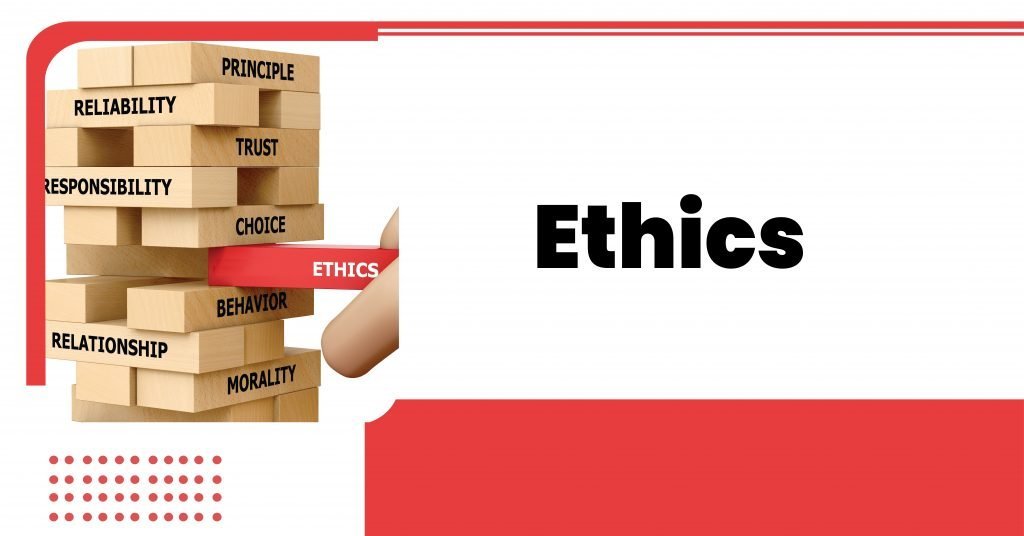Ethics plays a very important role in Education. Ethics are Interpreted as the discipline of dealing with good and bad with commitment and moral duty. … It is classified as unique values such As integrity and discipline, Honesty amid others, and applies them in daily routines. Ethics is based on well-founded standards of right and wrong that prescribe what humans ought to do, usually in terms of rights, obligations, benefits to society, fairness, or specific virtues. …”Being ethical is doing what the law requires.” Ethics consists of the standards of behavior our society accepts. Ethics is what guides us, to tell the truth, keep our promises, or help someone in need. There is a framework of ethics underlying our lives on a daily basis, helping us make decisions that create positive impacts and steering us away from unjust outcomes.
So, what are the common work ethics and how are these ethical behaviors valuable to a school or organization?
Integrity
One of the most important workplace ethics is integrity. By definition, integrity is the “quality of being honest and having strong moral principles, a personal code of conduct that goes above the level of good conduct and encompasses the spirit of good conduct.” Students with integrity are usually the ones you can count on, the ones with the highest moral values and the ones who are bent on doing the right thing at all times.Honesty
Being an honest individual means you do not deceive others by giving out misleading information. This includes the truthful way of conduct that is usually without the intention of lying, cheating or any form of falsification. Customers typically only deal with a business or a service provider whom they trust. In a workplace, an honest person is the one you can rely on to continue doing their best in their jobs for the peoples benefits.Discipline
At times, a student may be talented in his line of work but lacks the commitment and dedication to complete the tasks given. It requires a certain level of discipline to not only complete the tasks within a certain time frame but to also execute them well, instead of doing just the bare minimum at the very last minute. Disciplined students are extremely important as they ensure that all assignments and projects are delivered and executed in a timely manner.Fair and respect
Achieving an ethically strong workplace involves the cooperation of every student, from top decision-makers/leaders to entry-level students. No matter which level you are at, you need to ensure that all your actions are fair and just, particularly if you are entrusted with a position to lead. This will ensure a positive work culture in your school or organization. Always remember that every one of your students deserves to be treated with respect and dignity, regardless of who they are or which position they are at.
SCHOOLS ETHICALS ISSUES
Social And Ethnic Issues
Social and ethnic differences are often ignored in public schools, possibly leaving some students behind. For instance, a child from a poor background might be malnourished and have issues at home that prevent them from doing homework. The child is punished at school versus having an alternative presented.Bullying
Bullying affects all schools. However, public school teachers and counselors often ignore the signs or brush it off when students report something. They’d prefer to stay out of moral and ethical issues as much as possible to avoid any public complaints from parents. However, it’s the moral obligation of adults and students to report and stop bullying whenever possible to avoid escalation.Assessment Problems
Assessments should always be graded ethically. Teachers may give a student extra points to ensure they pass. Or, they may even grade lower at times to provide a better curve for all students. However, any type of false grading is unethical. It doesn’t help the teacher, student, school or even society. Assessments should be used to determine if a student fully understands the concepts or needs additional help. Unethical grading prevents students from getting the help they need.Preferential Treatment
It’s far too common for teachers, principals and school administrators to show preferential treatment. Teachers may grade one student harshly while letting another slide simply because they like them better. A principal wanting more money for boosters might show star athletes preferential treatment in order to keep parents donating. They might also suggest teachers give them better grades so they can keep playing. No matter what the reason, preferential treatment is never ethical. This shows students they don’t have to work hard in life. At the same time, this happens with staff as well. Some teachers may be shown preferential treatment and get away with unethical behavior simply because of tenure or they went to a certain university. While there are many ethical issues in schools, all of these issues are teaching opportunities to improve ethics in students to create a more ethical society.
SO WHAT’S NEXT?
It is the responsibility of parents and teachers to impart and transmit ethical values to children and students. It is important to teach ethics at schools and even at the college level to create better citizens and society. Ethical values do not allow you to act violently and unethically. Crime against women, theft, and other immoral issues in society can easily be tackled by imparting ethical values.
Some people claim that ethics cannot be taught so making these a part of curricula is not practical. Even one of the editorials on the topic in the Wall Street Journal stated that “ethics courses are useless because ethics can’t be taught”. In addition to this, there are no rules and standard definitions of the concept. What is right for you may not be the same for another person. Cultural, religious, spiritual, and many such factors make ethics and these obviously differ from person to person and community to community.
But students must be taught ethics and their importance. Students should participate in moral-building activities. This should not be taught like science or math but should be taught in interactive and innovative sessions. Student-level involvement and interaction can make this a very interesting issue. Schools can organize group discussions with experts, it can be taught in the form of a story, or rhyme or act can be presented to clarify the concept of ethics. Aga Khan has recently suggested that ethics should be taught along with other subjects. A young mind is like a clean slate so teaching ethics at such a tender age would be highly beneficial.
CONCLUSION
In conclusion, ethics is certainly one of the most important requirements of humanity. Furthermore, without ethics, the world would have been an evil and chaotic place. Also, the advancement of humanity is not possible without ethics. There must be widespread awareness of ethics among the youth of society. We must make this effort to ensure our children and their and theirs grow up. In a society that is filled with good and with the right ethics in life.

Mrs. Sarita Almeida
B.A.|| B.Ed
School Principal at Rahul Education, Mother Mary’s English High School


